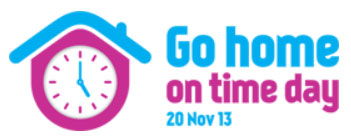 Go Home on Time Day is an annual initiative of The Australia Institute, in partnership with beyondblue. The Day is a light-hearted way to start a serious conversation about work-life balance. The ASU encourages members and supporters to participate in the Day as the issue of work-life balance can impact the well-being of workers and their family and friends in so many different ways. Mark Wednesday 20 November in your calendar and visit the campaign website today: www.gohomeontimeday.org.au.
Go Home on Time Day is an annual initiative of The Australia Institute, in partnership with beyondblue. The Day is a light-hearted way to start a serious conversation about work-life balance. The ASU encourages members and supporters to participate in the Day as the issue of work-life balance can impact the well-being of workers and their family and friends in so many different ways. Mark Wednesday 20 November in your calendar and visit the campaign website today: www.gohomeontimeday.org.au.
Businesses of all sizes are encouraged to participate in the Day – postpone those last minute meetings, plan a post-work picnic with the kids, or if getting out the door on time just isn't possible, hold a lunchtime yoga class, or a morning or afternoon tea.
CEO of beyondblue, Ms Kate Carnell AO, believes it's important that both employees and employers recognise the direct link between working long hours and mental health.
"Everyone experiences peaks in their workload which require working longer hours occasionally, but if you're 'under the pump' consistently, it can lead to job stress which is linked to depression and anxiety. Depression caused by job stress costs Australian businesses $12.3 billion every year through reduced productivity and staff turnover. So poor work-life balance takes its toll on both employees and businesses," she said.
The Australia Institute will release new research in the lead-up to Go Home on Time Day focusing on the experiences of the overworked and the underworked (i.e. those struggling to enter the workforce or those who want to work more hours).
Findings among the overworked include:
- Unpaid overtime equates to $109.6 billion or 7.4 per cent of GDP
- 5.1 million employees eat their lunch while working
- One in four employees checks work emails and answers work calls outside of work hours.
While, among the underworked:
- 2.8 million employees want to work more hours than they currently do
- More than 250,000 Australians are out of the workforce due to caring responsibilities
- One in four Australians said the main barrier to returning to work is too few jobs.
"When millions of Australians work too much and millions more can't find enough work it is time we did something differently. Go Home on Time Day is an opportunity to start an important national conversation about the type of workplace culture we want in Australia," said Dr Richard Denniss, Executive Director of The Australia Institute.
Join the conversation!
Go Home on Time Day campaign website
Go Home on Time Day Facebook Page
Go Home on Time Day Twitter

